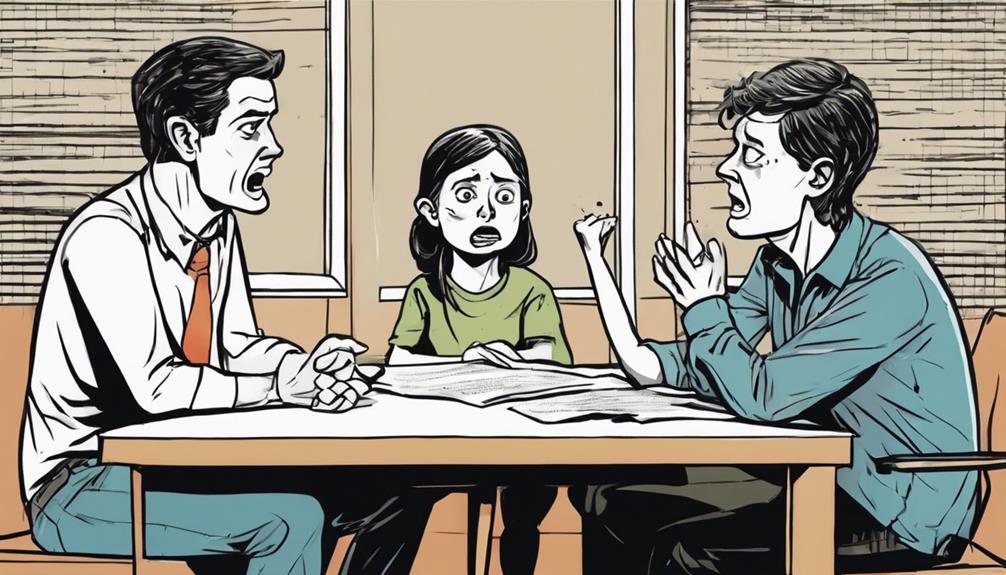Seeing the other parent’s side in co-parenting can sometimes lead to **legal issues** and impact your kid. Clear **communication** helps solve these problems. Avoiding arguments keeps things calm at home for your kid. Think hard before making choices that could stir the pot. Expert advice gives helpful **strategies** in tough spots. Focus on your child’s joy to create easy co-parenting. Mutual **respect** and clear talk are crucial for co-parenting to work well. Learning more tips can offer better ways to handle co-parenting challenges.
Key Takeaways
- Blocking communication with the other parent can have legal consequences.
- Seek legal advice before restricting communication to avoid legal issues.
- Court intervention might be necessary if communication is blocked.
- Document any harmful attempts to restrict communication for legal purposes.
- Violating court-ordered parenting plans by blocking communication infringes on rights.
Understanding Co-Parenting Dynamics
Understanding the dynamics of co-parenting involves managing shared parental responsibilities and collaborative decision-making. In the domain of parenting, co-parenting specifically focuses on how parents work together to raise their children after separation or divorce. This includes making joint decisions on where children will live, visitation schedules, education, healthcare, religion, and extracurricular activities.
The ultimate goal of co-parenting is to guarantee the well-being of the children involved by creating a stable and nurturing environment.
Challenges in co-parenting can arise due to differing values, principles, and goals between the parents. It's essential for co-parents to communicate effectively, respect each other's opinions, and find common ground to navigate these challenges successfully.
Appropriate co-parenting practices are determined by the unique circumstances of each family and require flexibility, compromise, and a focus on the best interests of the children.
Impact of Communication Challenges

Understanding the dynamics of co-parenting involves recognizing how communication challenges impact the collaborative decision-making process between parents. Effective communication is key to creating a successful co-parenting relationship. When communication breaks down, conflicts can arise, leading to misunderstandings and inconsistent parenting approaches. This inconsistency can cause confusion for the child and disrupt the stability of the co-parenting arrangement. By addressing communication issues early on and establishing clear communication channels and boundaries, co-parents can work together more effectively to make decisions that benefit their child.
| Impact of Communication Challenges | ||
|---|---|---|
| Challenges | Effects | Resolution |
| Lack of clear communication | Misunderstandings and conflicts | Establishing communication guidelines |
| Inconsistent parenting approaches | Child confusion | Creating a unified parenting plan |
| Avoiding addressing issues | Escalation of conflicts | Open and honest discussions |
| Setting boundaries | Maintaining respect | Establishing mutual boundaries |
Effective communication not only helps in resolving conflicts but also ensures that both parents are on the same page when it comes to decision-making.
Legal Considerations for Blocking Communication

Blocking communication with the other parent can have legal implications that may need to be addressed through court intervention. When co-parenting, it's important to take into account the legal consequences of limiting communication.
By blocking the other parent without valid reasons, you could be violating court-ordered parenting plans and infringing on their rights. If you find it necessary to restrict communication for the well-being of your child, document instances where communication attempts were harmful. Seek legal advice before taking any action to make sure you're within your rights.
In cases where blocking communication is unavoidable, court intervention may be necessary to address concerns. Consistent documentation of the reasons behind the block can support your actions in court.
Signs of Inappropriate Co-Parenting
Recognizing signs of inappropriate co-parenting is vital for identifying areas of conflict and addressing them effectively to guarantee a healthy co-parenting relationship.
Signs that indicate inappropriate co-parenting include high conflict, unresolved issues, lack of support, disrespect, constant arguments, and difficulty in making joint decisions.
When parents engage in constant arguments or show disrespect towards each other, it can create emotional distress for children and impact their overall well-being.
Inappropriate co-parenting can stem from unresolved issues between parents, leading to a challenging environment for all involved. It's essential to address these issues early on to prevent further negative impacts on the family dynamic.
Crafting a detailed parenting plan can help establish boundaries and expectations, providing a roadmap to navigate inappropriate co-parenting situations effectively.
Importance of Healthy Co-Parenting Practices

Addressing inappropriate co-parenting behaviors is essential for fostering a healthy co-parenting relationship that prioritizes the well-being of your children. Healthy co-parenting practices are critical for promoting positive relationships between parents and benefiting the child's well-being.
Here are some key aspects of healthy co-parenting:
- Effective Communication: Open and honest communication between co-parents is essential for making shared decisions about child custody and maintaining a respectful relationship.
- Respect: Showing respect towards the other parent, even in challenging situations, sets a positive example for children and helps build healthy relationships.
- Cooperation: Working together as a team to address parenting issues and support each other's roles in the child's life fosters a sense of unity and stability.
- Boundaries: Establishing clear boundaries and respecting each other's space and decisions can help reduce conflicts and create a more harmonious co-parenting environment.
- Well-being: Prioritizing the child's well-being above personal differences ensures that decisions are made with the child's best interests in mind, promoting a healthy co-parenting dynamic.
Managing Co-Parenting Boundaries

When managing co-parenting boundaries, remember to set clear expectations, establish communication guidelines, and prioritize mutual respect. These key points will help you navigate challenging situations and maintain a healthy dynamic with your co-parent.
Setting Clear Expectations
To effectively manage co-parenting boundaries, it's essential to set clear expectations between both parents. Clear expectations not only help in reducing conflicts but also establish a solid foundation for successful co-parenting.
Here are five key ways to set clear expectations in co-parenting:
- Define roles and responsibilities: Clearly outline who's responsible for what to avoid misunderstandings.
- Establish communication guidelines: Agree on how you'll communicate about important matters regarding your children.
- Set firm boundaries: Clearly define limits to prevent overstepping or confusion.
- Create a detailed parenting plan: Develop a thorough plan that covers visitation schedules, decision-making processes, and financial responsibilities.
- Enforce guidelines: Consistently uphold the expectations you have set to maintain a healthy co-parenting relationship.
Communication Guidelines
Establish clear boundaries in your co-parenting relationship by implementing effective communication guidelines to manage and maintain healthy interactions.
Limit your communication to essential child-related matters to avoid unnecessary conflicts. Creating a detailed parenting plan can help outline communication protocols, ensuring both parents are on the same page.
Consider using online tools like OurFamilyWizard for structured and monitored communication, making it easier to coordinate schedules and share important information.
Always maintain a child-focused approach during interactions to keep the focus on what's best for your children and minimize misunderstandings.
If the other parent's communication becomes harassing or disruptive, seek legal guidance to address the issue promptly and effectively.
Establishing Mutual Respect
To effectively manage co-parenting boundaries, it's essential to establish mutual respect between both parents. When parents respect each other, the co-parenting journey becomes smoother and more harmonious. Here are five key ways to cultivate mutual respect in your co-parenting relationship:
- Acknowledge and appreciate the role of the other parent in your child's life.
- Set clear boundaries and stick to them to avoid conflicts and misunderstandings.
- Communicate openly and effectively, ensuring that both parents are on the same page.
- Adhere to agreed-upon rules and decisions to create a sense of consistency for your child.
- Respect each other's opinions and decisions, even if you may not always agree, to foster a positive co-parenting environment.
Seeking Professional Co-Parenting Support

Consider exploring professional co-parenting support options to gain valuable guidance and strategies for managing difficult situations. Family law attorneys specialized in co-parenting issues can provide legal insights and options to navigate complex matters.
Therapists or counselors experienced in co-parenting dynamics offer assistance in improving communication and resolving conflicts effectively.
Online resources like co-parenting apps and support groups can equip you with practical tools and advice for handling co-parenting challenges with confidence.
Additionally, mediation services play an important role in facilitating discussions between co-parents and reaching mutually beneficial agreements, fostering a collaborative approach.
Strategies for Effective Co-Parenting

For effective co-parenting, setting clear communication boundaries is essential to minimize conflicts and promote smoother interactions with the other parent.
To enhance your co-parenting experience, consider implementing the following strategies:
- Establish a detailed parenting plan: Clearly outline roles, responsibilities, and schedules to avoid misunderstandings.
- Seek legal guidance if needed: If the other parent's behavior hinders effective co-parenting, consult with a family law professional for support.
- Utilize parallel parenting strategies: Reduce direct interactions by focusing on separate parenting approaches while still prioritizing the children's well-being.
- Leverage online communication tools: Platforms like OurFamilyWizard offer structured communication features to facilitate co-parenting discussions.
- Maintain structured communication: Consistency in how you communicate with the other parent can help minimize conflicts and promote a more harmonious co-parenting relationship.
Frequently Asked Questions
Can You Block Coparent?
Yes, you can block a co-parent, but it's important to ponder the impact. Blocking may disrupt crucial communication needed for your child's well-being. It could also lead to more conflicts and legal involvement.
Prioritize effective communication in co-parenting, even when it's challenging. Blocking might affect custody arrangements and legal outcomes. Seek legal guidance before taking this step to avoid potential consequences and guarantee a smoother co-parenting journey.
How to Deal With an Uncooperative Co-Parent?
Dealing with an uncooperative co-parent can be tough, but there are strategies to help. Set clear boundaries and communicate openly.
Seek legal advice to understand your rights. Document interactions and seek mediation if needed.
Remember, your child's well-being is the priority. Stay calm and focused on creating a positive co-parenting environment.
It may be challenging, but with patience and persistence, you can navigate this situation successfully.
Do I Have to Respond to My Coparent?
You don't have to respond to your co-parent every time, but it's usually best to maintain communication open for successful co-parenting.
Ignoring them can lead to more conflicts, hindering progress. Setting boundaries and addressing issues calmly can help navigate challenges. Legal advice can be useful in guiding appropriate responses.
Consistent, respectful communication is key for effective co-parenting. Aim for a balance that works for both of you while focusing on the well-being of your children.
How Do You Respond to a Controlling Co-Parent?
When dealing with a controlling co-parent, it's important to establish clear boundaries. Be firm in your communication and stick to your parenting plan.
Document any controlling behaviors for future reference. Seek support from a therapist or mediator to navigate these challenges.
If needed, consider legal advice for court intervention. Focus on your child's well-being while addressing control issues in a positive co-parenting manner.
Is Blocking the Other Parent a Common Co-Parenting Challenge?
When it comes to co-parenting, technology and parenting: block parents exist and can be a common challenge. Blocking the other parent on social media, messaging apps, or phone calls can hinder communication and create tension. It’s essential to find healthy ways to navigate co-parenting conflicts without resorting to blocking.
Conclusion
In the world of co-parenting, blocking the other parent may seem like a quick fix, but it can lead to more challenges in the long run. Remember, healthy communication and respect are key to successful co-parenting.
Stay focused on what's best for your children and seek support when needed.
In the end, fostering a positive co-parenting relationship will benefit everyone involved. So, put down the block button and pick up the phone for a constructive conversation instead.










